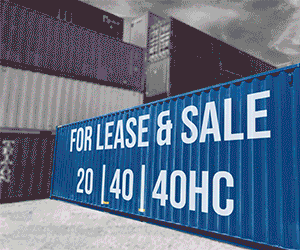As the global business environment accelerates towards smart, resilient, and agile supply chains, freight forwarders and entrepreneurs in the Middle East can make the most of the possibilities they create by joining forces with logistics leaders determined, adept, and well-equipped to make their business go places, opines Rahul Rai, Regional Head – Middle East & North West Africa

With its strategic location connecting the continents of Asia, Africa and Europe, the Middle East is already reinforcing its position as a global trade destination and hub in 2023 and beyond. Reports have indicated a growth of 4.3% between the duration from 2020 to 2025.
Traditionally heavily dependent on oil, most Middle Eastern countries are now moving their economies to be less oil reliant. Encouraging exports of other diverse types of goods, stimulating the growth in industrial and service sectors, along with several initiatives to promote trade and investment in countries like UAE, Saudi Arabia, Qatar, etc. are steps in this direction. Consequently, shippers and freight forwarders too, are building capabilities and partnering with reliable logistics services providers to maximize export potential.
Imports into the Middle East are also experiencing an upswing owing to population growth, improved per capita incomes, and growing internal demand for a plethora of products and services. Entrepreneurs from across the world are looking at countries in the Middle East, to come in and set up new businesses.
As they plan their global supply chains, business owners are increasingly preferring single-window shipping solutions from a partner they can rely on. Empowering shippers and freight forwarders are key industry players like ECU Worldwide, offering global cargo movements across a vast network of 180 countries, and bolstering businesses with door-to-door deliveries in over 50 markets.
Many international supply firms are making JAFZA (Jebel Ali Free Zone), and other similar set-ups in the Middle East a key link in their global supply chains, to benefit from the tax advantages, clear business scenarios, global connectivity, and ease of doing business, world-class infrastructure for telecommunication, finance, e-governance, and more.
They tend to discover many more avenues to enhance business performance by partnering with global logistics leaders like ECU Worldwide with LCL consolidation and direct end-to-end export services from Jebel Ali to 32 destinations covering the Upper Gulf, Red Sea, Europe, Far East, East Mediterranean, East Africa, Indian Subcontinent, and Indian Ocean Islands, as well as direct end-to-end import services from 54 origins covering North America, Europe, East Mediterranean, Red Sea, Indian subcontinent, and Far East to Jebel Ali.
International air freight backed by transhipments between sea and air, charter options, prime/differed carry options and smooth inland transportation, allows for seamless movements of time-sensitive and urgent cargo too.
What really works well for customers in addition to solutions from the global LCL consolidation leader is the enhanced productivity and reduced back and forth that is a result of coordinating with the same provider for warehousing and distribution, including a bonded warehouse at Jebel Ali, third party logistics, customs clearance, special equipment handling facilities, etc.
Today, most of the countries in the Middle East are focused on smart mobility solutions, powered by use of technologies like automation, Artificial Intelligence and Machine Learning based software to optimize routes and networks. It is imperative that logistics companies align with this digital-first approach and deliver on customer expectations that are being shaped by the ease and convenience of multiple online applications and platforms used for a host of products and services.
Anticipating this shift much ahead of time, ECU360 – ECU Worldwide’s state-of-the-art digital logistics platform, is today transforming shipping into an almost e-commerce like experience for freight forwarders and customers, with its features like instant quotes, quick bookings, access to sailing schedules in advance, and enhanced track and trace.
With order delivery timelines steadily reducing and business models evolving to offer same day, next day or fixed day order fulfillments, especially in the e-commerce space, the e-commerce boom also contributes significantly to rising carbon emissions. It is encouraging to note, however, that around 65% of customers in the region have become more eco-friendly post the global COVID-19 pandemic and 57% are willing to change their purchase habits to be more sustainable. And with their sustainability strategy focused on ESG, logistics majors like ECU Worldwide are increasing the pace of these strides towards green logistics.
Key takeaways
- Businesses are increasingly exploring opportunities in the Middle East, and this is creating demand for logistics services.
- With customer preference for single-window solutions from one reliable partner on the rise, they are turning to players like ECU Worldwide that can offer global connectivity and customized services.
- Resilience, agility, digitalisation, a conscious focus on sustainability, are likely to be the trends dominating logistics in the Middle East in the months and year ahead.











